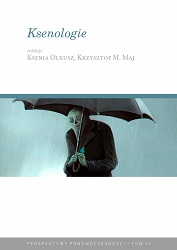Rewolucjoniści i pariasi
Revolutionaries and Pariahs
The History of the Beginning and Twilight of the Hungarian Psychoanalysis
Author(s): Agnieszka Więckiewicz
Subject(s): Philosophy, Ethics / Practical Philosophy, Psychology of Self, Psychoanalysis
Published by: Ośrodek Badawczy Facta Ficta
Keywords: psychoanalysis;Sándor Ferenczi;emigration;refugees;antisemitism;Hungarian Psychoanalytical Society
Summary/Abstract: In the chapter, Agnieszka Więckiewicz presents the history of a development of the Hungarian psychoanalytical school in the first two decades of the twentieth century in Hungary. The fate of psychoanalytical school in Budapest is one of the most tragic examples of a destruction of the psychoanalytical movement established by Sigmund Freud. Difficult political situation in Hungary has inhibited the progress of the Freudian thought in the medical society. The author focuses on the history of Hungarian psychoanalysis in the light of emigration and displacement which made a huge impact on psychoanalytical thought and practice in Hungary. Besides the author presents the story of Sándor Ferenczi – one of the most crucial figures in the Budapest School of Psychoanalysis. The aim of the chapter is to introduce the history of the Hungarian psychoanalysis which is still very little known in Polish science. The author argues that the history of psychoanalysis in Hungary is a complex story of difficult, and sometimes contradictory, experiences of exclusion, antisemitism, war, forced emigration, displacement as well as of an utopian faith in political and civil revolution. In the first part of the chapter the author talks about the beginnings of psychoanalytical mouvement in Hungary. Between 1908-1918 the Freudian thought had inspired not only medicine and medical practice but also the new Hungarian literature. The author shows the complexity and multidirectionality of a path in which Freudian thought transferred to Hungarian science and culture. The second part applies to the waves of the forced emigration, mostly in two periods: first between 1919-1924 and second between 1938-1941. In regard to difficult political situation in Hungary the great majority of Hungarian Freudians developed their theories in other countries: mostly in Great Britain, France and United States of America. The author discusses also the most important ideas of the Budapest School of Psychoanalysis. The chapter ends with a reflexion about a contemporary situation of Hungarian psychoanalysis and a phenomenon of the rebirth of a Ferenczian theory.
Book: Ksenologie
- Page Range: 65-84
- Page Count: 20
- Publication Year: 2018
- Language: Polish
- Content File-PDF

